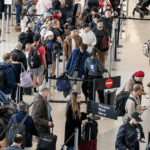
US Transportation Secretary Sean Duffy is urging air travellers to dress better and be more civil – and it’s touching a nerve at a time when many Americans consider air travel more frustrating than ever.
Ahead of what’s expected to be the busiest Thanksgiving travel season in 15 years, Duffy launched a campaign last week titled “The Golden Age of Travel Starts with You”, in which he harkened back to the 1950s and ’60s to call for a return to civility and class in air travel.
But as air traffic controllers remain short-staffed and customers face frequent flight delays, both social media users and aviation experts say Duffy is missing the point.
A video ad for the Department of Transportation’s campaign juxtaposes old footage of smiling airport staff and orderly passengers with modern social media videos of people starting fights on planes, putting their bare feet up on seats and engaging in other disruptive behaviour.
“Manners don’t stop at the gate. Things aren’t what they used to be,” Duffy chimes in. “Let’s bring civility and manners back. Ask yourself, are you helping a pregnant woman put her bag in the overhead bin? Are you dressing with respect?”
The Federal Aviation Administration predicts this week will be the busiest Thanksgiving travel season in 15 years – with more than 52,000 flights on 25 November alone.
And aviation experts say Duffy’s message won’t have much effect on the flying atmosphere.
Scott Keyes, a flight expert and founder of the flight deals site Going.com, told the BBC that while it sounds great to ask everyone to just be nicer to each other, in terms of the actual efficacy of that message, “you might as well ask a wall to start printing you money”.
“Very few people show up for their flight itching to pick a fight with another passenger,” Mr Keyes said. And once they reach the level of agitation where they’ve started picking a fight with a flight attendant or passenger, he said they’re unlikely to remember Duffy’s words or calm down.
The underlying problem, he says, is people letting their tempers get the best of them, which he sees as a worsening problem across all of society, not just on airplanes, and not just in the US.
Since the secretary started posting about the campaign on X, some of his subsequent posts have been flooded with thousands of comments critical of Duffy’s message.
“If you want us to be respectful humans at the airport stop treating us like cattle,” one X user commented. “Remove the demoralising and humiliating TSA checks (that accomplish nothing) and find a way to get the airlines to give more than 2 inches of space per seat.”
Henry Harteveldt, a travel industry analyst and president of Atmosphere Research Group, told the BBC that while Duffy makes a valid point that being considerate is important, his call to dress nicer won’t change a thing.
“You could be dressed in black tie and still be a jerk, and you could be wearing sweatpants and a sweatshirt and be the most considerate person in the world. The clothes, in this case, do not make the person,” Mr Harteveldt said.
A number of commenters on Duffy’s X post have pointed out that the reason they dress so casually is because of how cramped plane cabins have become, as well as the expectation of extended delays.
“Tell you what,” one X user commented. “You get the planes running on time, and we won’t dress to spend the night in the damn airport.”
And another: “Can I get my legroom back?”
One X user, who has nearly 500,000 followers, posted, “Duffy is absolutely right…BUT our declining travel dress is also a reflection of how airlines treat us. Cattle boarding, tiny seats, penny pinching every beverage cost and just generally miserable.”
Echoing what many social media users have pointed out, Mr Harteveldt said the airlines bear some responsibility for passengers’ bad behaviour, too, by making their “economy cabins so unpleasant and so physically uncomfortable” that it naturally puts passengers in a bad mood.
Couple that with minimal flight attendant staffing, minimal amenities on board, and the airlines’ embrace of the pay-for-what-you-want business model, “you don’t get people smiling as they walk down the loading bridge to the plane,” Mr Harteveldt said.
Still, others have praised the secretary’s core message of respect and kindness, with one commenting, “I will do my small part to spread civility in my own life”.
Air travel has changed – but it’s not all bad
The Department of Transportation says the campaign isn’t only about saying “please” and “thank you” – it’s also about reducing the amount of violent and disruptive incidents on airplanes and in airports.
The agency says that since 2019, there’s been a 400% increase in in-flight outbursts, including both unruly behaviour and violent attacks. Since 2021, the department has recorded 13,800 unruly passenger incidents, and 1 in 5 flight attendants has experienced a physical incident, the agency said.
But experts dispute the idea that air travel has declined in quality.
Dan Bubb, an aviation historian and professor at University of Nevada Las Vegas, told the BBC that despite the rise in incivility cases, statistically that number isn’t very significant.
There are far more travellers and flights now than there used to be, and Prof Bubb said that makes it difficult to compare today’s airline incidents with past decades.
Mr Keyes pointed out what he sees as another major issue with Duffy’s message: air travel used to bring a host of other issues we no longer face today.
“It’s laughable how much worse air travel was back then,” Mr Keyes said.
Flying was far less safe, he said, noting that planes crashed and were hijacked more frequently. Flights were also far more expensive relative to income. Among other drawbacks: the cabins were filled with cigarette smoke, and flight attendants faced rampant sexism and stringent physical requirements.
Mr Keyes believes the FAA and DOT could make more of a difference in reducing passenger stress by pushing airlines to minimise the number of delays and cancellations.
Prof Bubb said it would also help to “give passengers a little more physical space in terms of seat size and legroom, include meal service in the price of their tickets, reduce alcohol consumption, make going through security at airports less stressful, make parking at airports easier, expand boarding area space at airport gates”.
And, he added, we do still need to encourage passengers to be courteous to flight crews and each other.




